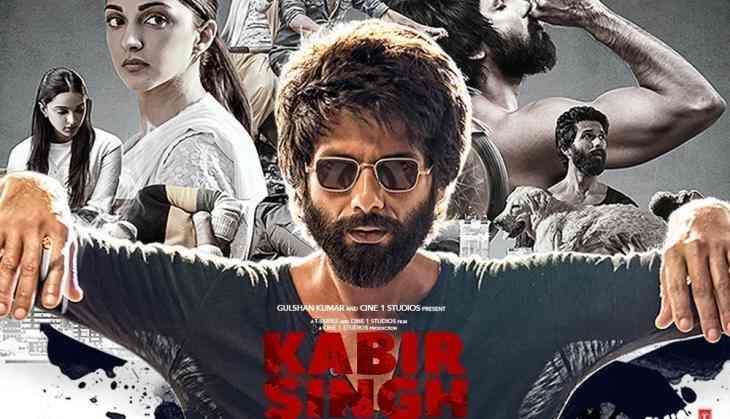NEW DELHI: Love may be a many splendoured thing in Hindi cinema down the ages but playful stalking, a contradiction in terms really, is often cute and brooding aggression spilling over to violence and self-destruction the hallmark of intense, macho love.
Audiences have loved it all, be it the charming Shammi Kapoor in “An Evening in Paris” or Dharmendra as the lovable Veeru in “Sholay” and more recently Salman Khan in “Tere Naam”, Dhanush in “Ranjhanaa” and playing in theatres right now Shahid Kapoor in and as “Kabir Singh” — all heroes who took the woman’s yes as a given and all films that went on to become blockbusters.
With “Kabir Singh”, a remake of the Telugu hit “Arjun Reddy”, the spotlight is once again on Indian cinema’s problematic portrayal of romance and its preoccupation with toxic male heroes.
The film, which triggered a debate on the gender dynamic in Bollywood romances, has been panned by critics as misogynistic for its portrayal of the troubled protagonist, a doctor who spirals into destructive rage when the object of his desire gets married to somebody else.
Notwithstanding the debate it has triggered, the film is close to the Rs 200 crore mark within just two weeks of its release, well on its way to becoming Shahid’s highest opener and another mega hit.
Film critic Ajay Brahmatmaj said the film’s success should not come as a surprise.
“Kabir Singh is dangerous for society and viewers because it sides with age-old patriarchy and puts a 21st century woman in a cage. It is regretful that all this happens in the garb of a love story.”
None of this is new but has acquired darker, more ominous overtones.
If Kabir Singh is one end of the spectrum, Devdas is perhaps the other, one edgy the other elegiac and both alcoholics.
The many iterations of “Devdas” with K L Saigal, Dilip Kumar and Shah Rukh Khan — and even Abhay Deol in “Dev D” — have all been synonymous with the self-destructive lover and all have been successful.
And just in case that model of love is forgotten, every couple of years there are films like “Tere Naam”, “Raanjhaana” and now “Kabir Singh”. The ramifications of stalking seen in assault cases and even acid attacks is rarely considered.
In fact, a listing of “chase songs”, or rather ‘stalker songs”, over the decades can fill up numerous pages.
Both director Sandeep Reddy Vanga and Shahid have promoted “Kabir Singh” as “dark and edgy” and the central hero’s propensity for sleeping around, drugs and alcohol as a manifestation of his love.
“I’ve had my intense, self-destructive, heartbreak and angsty moments, where I’ve not been in control… That feeling of falling apart and self-destruction, not being able to deal with loss… Only from great love, comes great anger” Shahid told PTI in a recent interview.
“I will take being called a modern Devdas as a compliment,” he told reporters later.
Vanga, who also directed the Telugu version, said he wanted to move beyond the ‘boy-meets-girl’ love story.
“It is about this character, who has a specific way of looking at a girl, a specific way of expressing his emotions and his love for her. It is about how his life changes suddenly due to love. Love changes things. I have tried to make the story, the character as real and simple as possible,” Vanga told PTI.
The film has come for severe criticism from film critics for the way it celebrates an obnoxious hero, who calls the woman “meri bandi” the moment he lays his eyes on her and warns everyone in the college that she is off-limits for every other man.
The film is a success because the audiences are mostly men, said Brahmatmaj.
“In ‘Kabir Singh’, they see a hero who can do what he wants. He can break all the rules and discard morality. At a time when mob lynching is getting the support of the establishment and society, we should not be surprised by the success of ‘Kabir Singh’. We should rather worry about where we have reached as a society,” Brahmatmaj told PTI.
Vani Tripathi Tikoo, a Central Board of Film Certification (CBFC) member, also termed the film “terribly misogynistic” and blasted the makers for glorifying violence against women.
Tikoo questioned the decision of stars to back films such as this one.
“I find it baffling that “Big Stars” make these choices who actually lead by Example! As the Cinematic journey of the country has gone beyond its ‘Traditional’ Women as ‘Eye Candy’ routine. Can we remember how movie characters are idolised?” Vani said.
Singer Sona Mohapatra, an outspoken commentator on issues related to the Hindi film industry, said the film’s “deeply disturbing, dark & dangerous politics” are difficult to keep aside.
While many see Kabir Singh as an example of everything that is wrong with Indian men, Cicilia Chettiar, head of department, Department of Psychology at Mumbai’s Maniben Nanavati Women’s College had a different take.
Kabir Singh should be considered as someone who has no emotional regulators and needs treatment, she said.
“This is a movie about an individual who is suffering and suffering not just because he lost his love but because he has no ability to regulate his emotion, which in a world like today, which is so structured, organised and normative, becomes very difficult,” Chettiar told PTI.
“This is what we refer to as a personality disorder,” she said.
Chettiar described his behaviour a personality disorder where there is “promiscuity, excessive substance abuse, lot of drama and a malfunctioning emotional regulator”.
“Shahid Kapoor’s character feels everything intensely, he feels love intensely, he feels anger intensely, he feels hatred intensely,” she added. (AGENCIES)


